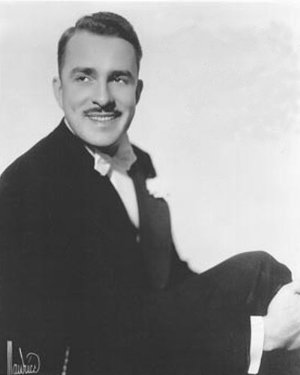Glen Gray

-
Birth Name
Glenn Gray Knoblauch -
Born
July 7, 1900
Roanoke, Illinois -
Died
August 23, 1963 (age 63)
Plymouth, Massachusetts -
Featured Vocalists
Bob Anthony
Eugenie Baird
Skip Nelson
As leader of the Casa Loma Orchestra, Glen Gray’s name is synonymous with the band, and it was often billed under his name, especially in its later years. Progressive for their time, as early as 1929 the Casa Loma Orchestra began playing the same mixture of hot jazz and sweet ballads that Benny Goodman would later popularize, making it the first white band to explore the emerging swing style.
Originally named the Orange Blossoms, the group first formed in Detroit during the mid-1920s as an offshoot of Jean Goldkette’s orchestra. Gray, then known as Spike Knoblauch, joined the group in the winter of 1925-26 as a sax player. Henry Biagini was leader. Playing in and around the Detroit area, the Orange Blossoms were booked into a brand new Toronto club called the Casa Loma in 1927. Built in preparation for a visit by the Prince of Wales, the club never opened, and in 1929 the Orange Blossoms, shedding Goldkette’s mantel and striking out on their own, decided to rename themselves the Casa Loma Orchestra in memoriam.
The bandmembers formed a cooperative, dismissing Biagini and electing Gray as president and leader. Mel Jenssen became front man. They moved to New York and were soon booked into the Roseland Ballroom, where a representative from Okeh Records discovered them and offered a deal. Gene Gifford’s imaginative arrangements set the band’s style. Alternating between big band jazz and sentimental ballads, the group sounded better on the latter than it did on the former. Never in its history did it really have a great lineup, and often times it sounded flat when attempting jazz. Nevertheless, the Casa Loma Orchestra had a unique sound and quickly began to attract the attention of the hipper college crowd.
After cutting six sides for Okeh, the group signed with Brunswick. They were so popular, however, that Victor also signed them, and the group ended up recording on both labels simultaneously. Eventually they began to record exclusively for Brunswick and remained there until signing with Decca in 1943. Kenny Sargent, who also played sax, was vocalist for many years. “Pee Wee” Hunt also sang. On their first sides for Okeh and Brunswick, they were billed as simply the “Casa Loma Orchestra.” Victor however billed them as the “Glen Gray Orchestra.” After leaving Victor they began using the combined moniker “Glen Gray and the Casa Loma Orchestra.”
Slow Decline
In 1933 and 1934, the group was featured on the Camel Caravan radio program, becoming the first swing band to appear on a commercial radio series. They played both summers at the Glen Island Casino, where frequent radio broadcasts helped boost their popularity across the country. By 1935, however, the swing era had begun, and the orchestra was no longer a trend setter. Gifford, whose alcoholism made him unreliable, was fired and replaced by Dorsey Brothers arranger Larry Clinton, who did his best at the difficult job of writing book for the band. Despite these setbacks, they continued to remain popular, inaugurating the Paramount Theater’s stage band policy and settling in to a booking at the swank Rainbow Room.
In 1937, Gray decided to front the group himself and dismissed Jenssen. Clinton left for Tommy Dorsey and was replaced by Dorsey arranger Dick Jones. Arranger Larry Wagner joined the following year. By 1940, however, the Casa Loma Orchestra had begun to lose its popularity. Major personnel changes followed. Tutti Camarata and Harry Rodgers now arranged.
The band first began to use outside vocalists in 1939, with Clyde Burke singing that year. The LeBrun Sisters became the group’s first female vocalists in 1942. Eugenie Baird joined in early 1943, remaining until November 1944 when she left for Bing Crosby’s radio program. Both Sargent and Hunt left in early 1943. Sargent returned to his native Memphis, and Hunt went into advertising. Bob Anthony, fresh out of the navy, joined in late 1943 to replace them. Anthony left in mid-1944, with Skip Nelson taking his place. Nelson stayed until January 1946. Fats Daniels sang novelty numbers in 1944. Famed trumpet player Red Nichols also appeared with the band for a short time in 1944. By 1946, though, the group’s popularity had tanked, and they called it quits.
Gray experienced a comeback in the 1950s when Dave Cavanaugh of Capitol Records suggested he create a studio orchestra to record popular tunes from the big band era. The series proved successful. Gray, though, turned down offers to lead his own band again, preferring to remain in Plymouth, Massachusetts, where he made his home. Glen Gray passed away from cancer in 1963.
Sources
- Simon, George T. The Big Bands. 4th ed. New York: Schirmer, 1981.
- “Memphis Holds Kenny Sargent.” Down Beat 1 Apr. 1943: 1.
- Grennard, Elliot. “On the Air: Glen Gray.” Billboard 13 May 1943: 22.
- “Hutch Seriously Ill.” Down Beat 15 Jun. 1943: 6.
- “Band Vocalist Returns With Battle Scars.” Down Beat 1 Nov. 1943: 14.
- Cohen, Harold V. “The Drama Desk.” Pittsburgh Post-Gazette 14 Dec. 1943: n.p.
- “Buffalo Relights to 24G with Gray.” Billboard 5 Feb. 1944: 22.
- “Night Club Reviews: Panther Room, Chicago.” Billboard 12 Feb. 1944: 29.
- “Glen Gray Seeks Lead Horn Men.” Down Beat 1 Jul. 1944: 1.
- “Eugenie Quits Casa Loma.” Down Beat 1 Nov. 1944: 4.
- “Advanced Record Releases.” Billboard 7 Aug. 1945: 66.
- “Vaudeville Reviews: Golden Gate, San Francisco.” Billboard 29 Sep. 1945: 35.
- “Movie Machine Reviews.” Billboard 20 Oct. 1945: 76.
- “Vaudeville Reviews: Chicago, Chicago.” Billboard 17 Nov. 1945: 35.
- “Music As Written.” Billboard 19 Jan. 1946: 18.